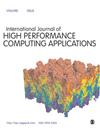广义分层调度的分析性能模型
IF 2.5
3区 计算机科学
Q2 COMPUTER SCIENCE, HARDWARE & ARCHITECTURE
International Journal of High Performance Computing Applications
Pub Date : 2022-03-26
DOI:10.1177/10943420211051039
引用次数: 2
摘要
高性能计算(HPC)工作流程正在经历动荡的变化,包括规模和复杂性的爆炸式增长。尽管有这些变化,大多数批处理作业系统仍然使用缓慢、集中的调度器。广义层次调度(GHS)解决了现代工作流面临的许多挑战,但GHS尚未在HPC中得到广泛应用。阻碍采用的一个主要困难是缺乏性能模型来帮助配置GHS以在给定应用程序上获得最佳性能。我们提出了GHS的分析性能模型,并在中等规模的系统上用四种不同的应用验证了我们提出的模型。我们的验证表明,我们的模型在预测GHS的性能方面非常准确,解释了98.7%的方差(即R2统计量为0.987)。我们的结果也支持GHS克服了调度吞吐量问题的说法;我们在中等规模的系统上测量到吞吐量提高了270倍。然后,我们将我们的性能模型应用于预exascale系统,在该系统中,我们的模型预测吞吐量将提高四个数量级,并深入了解下一代系统上的GHS优化配置。本文章由计算机程序翻译,如有差异,请以英文原文为准。
An analytical performance model of generalized hierarchical scheduling
High performance computing (HPC) workflows are undergoing tumultuous changes, including an explosion in size and complexity. Despite these changes, most batch job systems still use slow, centralized schedulers. Generalized hierarchical scheduling (GHS) solves many of the challenges that face modern workflows, but GHS has not been widely adopted in HPC. A major difficulty that hinders adoption is the lack of a performance model to aid in configuring GHS for optimal performance on a given application. We propose an analytical performance model of GHS, and we validate our proposed model with four different applications on a moderately-sized system. Our validation shows that our model is extremely accurate at predicting the performance of GHS, explaining 98.7% of the variance (i.e., an R2 statistic of 0.987). Our results also support the claim that GHS overcomes scheduling throughput problems; we measured throughput improvements of up to 270× on our moderately-sized system. We then apply our performance model to a pre-exascale system, where our model predicts throughput improvements of four orders of magnitude and provides insight into optimally configuring GHS on next generation systems.
求助全文
通过发布文献求助,成功后即可免费获取论文全文。
去求助
来源期刊
CiteScore
6.10
自引率
6.50%
发文量
32
审稿时长
>12 weeks
期刊介绍:
With ever increasing pressure for health services in all countries to meet rising demands, improve their quality and efficiency, and to be more accountable; the need for rigorous research and policy analysis has never been greater. The Journal of Health Services Research & Policy presents the latest scientific research, insightful overviews and reflections on underlying issues, and innovative, thought provoking contributions from leading academics and policy-makers. It provides ideas and hope for solving dilemmas that confront all countries.

 求助内容:
求助内容: 应助结果提醒方式:
应助结果提醒方式:


